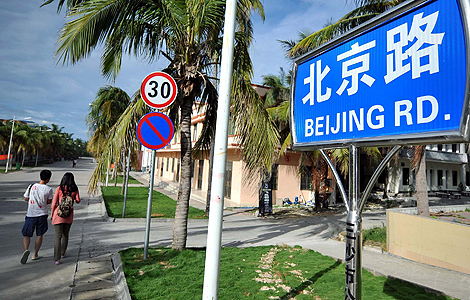Q2 growth seen sliding further
Updated: 2013-07-09 06:13
By Chen Jia (China Daily)
|
||||||||
China's economic growth is expected to further slide from a 13-year low as credit tightening policies and overcapacity continue to weigh on the world's second-largest economy.
GDP growth is estimated at 7.5 percent in the second quarter, from 7.7 percent for the January-March period, according to a forecast by analysts.
An economic slowdown may prompt the government to roll out more reforms after the Chinese economy last year expanded at the slowest pace since the Asian financial crisis in 1997.
"We maintain our Q2 GDP growth forecast of 7.5 percent, which is lower than the 7.7 percent in Q1," said Barclays China economist Chang Jian on Monday.
Chang said the manufacturing purchasing manager's index, or PMI, confirmed a further slowdown in industrial activity. She forecasts year-on-year industrial production growth to drop to 9 percent in June.
HSBC's PMI readings indicated that the manufacturing sector, which accounts for 40 percent of China's GDP, contracted in May and June.
Vice-Premier Zhang Gaoli has called for heightened attention and intensified efforts to address the country's complex economic problems.
China's economic conditions are "generally stable", but work remains arduous as the country is undergoing a difficult transformation period and the external environment is complicated and grim, Zhang noted during a fact-finding tour of Sichuan province from July 5 to 8.
Speaking at an economic conference in Sichuan, Zhang reiterated the importance of keeping the proactive fiscal policy and prudent monetary policy steady and advancing targeted measures to lift the economy.
He said that the country should take its long-term development into consideration during the current work, and properly handle the relation between stabilizing growth and promoting reforms to boost efficiency.
Zhang also pledged more funding support to medium-sized, small and micro-sized enterprises, export companies and high-tech firms.
Peng Wensheng, chief economist and managing director of China International Capital Co Ltd, said at a news conference on Monday that speeding up structural reform is the way out of the further cooling down of China's economic growth, which will attract more private capital to the country's service sector.
The reform focusing on the fiscal and financial system is expected to have a breakthrough in the third quarter, which may create a new but moderate driving force, to avoid growth dropping below 7.4 percent this year, he said. Considering the stubbornly high property prices and increasing local government debt, which have squeezed investment into industrial production amid the weak domestic and overseas demand, the growth is likely to remain lackluster in the second half, said Peng.
The company in June downgraded its GDP forecast to 7.4 percent, the lowest pace since 1990, from the previous prediction of 7.7 percent.
China's GDP increased 7.8 percent year-on-year in 2012, and the government's target is 7.5 percent this year.
"The lackluster growth could lead to modest inflation during the whole year," said Peng, who predicted that the consumer price index may remain at 2.6 percent this year, the same as in 2012, while the producer price index may show a negative 1.7 percent.
"Credit expansion of the real estate sector and the local government vehicles means that financial risks are still building in the medium and long term, which in turn limits the room for policy easing to support short-term growth," Peng said.
The National Bureau of Statistics is expected to release June's CPI and PPI figures on Tuesday.
Financial institutions estimate that the CPI may slightly rebound to 2.4 percent in June from 2.1 in May, while the PPI is likely to continue to drop from a year earlier.
The priority for the government in the next six months is to achieve a balance between growth stabilization and risk control, according to Peng.
An important objective of the financial system reform is to ease financing difficulties for private companies, especially small and medium-sized ones, he said.
"We expect the reform programs to reduce entry barriers in the financial sector, establish a deposit insurance system, and encourage the development of small and medium-sized financial institutions," he added.
Xinhua contributed to this story.
chenjia1@chinadaily.com.cn
(China Daily USA 07/09/2013 page13)

 China's youngest city glistens under palm trees
China's youngest city glistens under palm trees
 Xinjiang tourism recovering
Xinjiang tourism recovering
 Quebec disaster death toll jumps to 13
Quebec disaster death toll jumps to 13
 Mourn for students in San Francisco air crash
Mourn for students in San Francisco air crash
 Rolling stone finally settles
Rolling stone finally settles
 Double-decker bus caught fire in Shanghai
Double-decker bus caught fire in Shanghai
 China, Russia begin live-fire navy drill
China, Russia begin live-fire navy drill
 Grape expectations for Xinjiang county
Grape expectations for Xinjiang county
Most Viewed
Editor's Picks

|

|

|

|

|

|
Today's Top News
China improves maritime law enforcement
Air crash victims' families arrive in SF
Hopes are high for US, China talks
Laden's life on the run revealed
US mulls hastening withdrawal from Afghanistan
China's inflation grows 2.7% in June
Country singer Randy Travis in critical condition
Police look for suspects in Brazil soccer slaying
US Weekly

|

|







